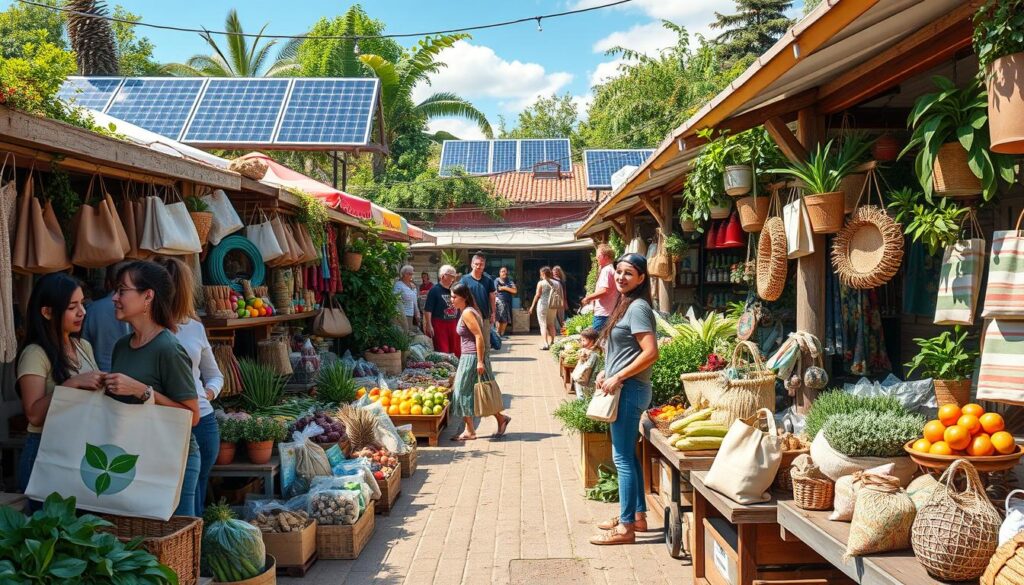Are you a conscious consumer? Our society is now more aware of how our buys affect the environment and social justice. Ethical consumerism is changing the market. It’s about making choices that are good for the planet and people.
Today, people want more from the brands they support. They want companies to be open and use sustainable methods. This change is big, with 66% of people worldwide ready to spend more on eco-friendly items.
Ethical consumerism is growing fast. It’s not just for a few anymore. It’s becoming what most people expect. Let’s dive into this important movement and see how our buying habits can change the world.
Key Takeaways
- Ethical consumerism is the practice of making purchasing decisions based on the social, environmental, and ethical impact of products and services.
- Ethical consumerism encompasses a range of issues, including fair labor practices, environmental sustainability, animal welfare, and social justice.
- Consumers are increasingly choosing brands that align with their personal values and support sustainable and ethical business practices.
- Ethical consumerism can drive positive change by encouraging companies to adopt more responsible and transparent practices.
- Embracing ethical consumerism can contribute to reducing environmental harm, promoting social responsibility, and creating a more equitable global economy.
What is Ethical Consumerism?
Ethical consumerism means buying things that don’t harm people or the planet. It’s about choosing products that are good for the environment and fair for workers. It also means knowing where things come from and how they’re made.
More people want to buy things that match their values. They care about issues like climate change and human rights. This is why ethical consumerism is becoming more popular.
Definition and Scope
Ethical consumerism is about thinking before we buy. It’s about how our choices affect the world and the people in it. It’s about picking fair trade items, eco-friendly brands, and cruelty-free goods.
The Rise of Conscious Consumption
More people are choosing to buy in a way that’s better for the planet. In fact, 37% of people worldwide are willing to spend more on things that are good for the environment. In Asia-Pacific, this number is even higher, at 55%.
People want to support brands that share their values. 94% of people will stick with a brand that is open and honest. And 63% want brands to speak out on important issues.
Why Ethical Consumerism Matters

Ethical and sustainable living is becoming more popular. It’s key to see how our choices affect the world. What we buy impacts the environment, social well-being, and brand reputation.
Environmental Impact
Choosing eco-friendly products helps reduce our environmental harm. 66% of global consumers are willing to pay more for sustainable goods (Nielsen report). This shows a growing interest in green products and practices.
Social Responsibility
Fair Trade ensures fair wages and safe work for workers in developing countries. Supporting ethical brands helps improve lives and supports a fair global economy.
Brand Reputation and Loyalty
87% of consumers will buy a product if a company supports their cause (Cone Communications study). 76% will not buy from a company that goes against their beliefs (Cone Communications study). Ethical brands gain loyal customers and a strong reputation.
Ethical consumerism lets us choose a sustainable lifestyle and support social causes. It encourages businesses to be more open and responsible. As consumers, we can make a difference with our purchases.
Factors Driving Ethical Consumerism

More people are thinking about how their buying choices affect the planet and society. They want to buy things that match their values. This means they look for brands that are open and honest about how they make things.
Increased Awareness and Transparency
People are now more curious about where and how things are made. Bad news about labor and the environment has made them more aware. A recent survey found that 87% of consumers will buy something if a company supports a cause they care about.
Social Media and Consumer Activism
Social media has changed the game for ethical shopping. It lets people share news, start campaigns, and check if companies are doing the right thing. Millennials and Gen Z especially want to buy things that help the world. They use their money to push companies to be better.
Even though ethical shopping is getting more popular, there are still hurdles. Some say it mainly helps rich people who can afford to care about ethics. Also, finding out where things come from can be hard. But, the push for better, greener choices is making a big difference.
What is ethical consumerism
Ethical consumerism is about knowing how products are made. We want goods that are made right, using good materials and fair trade. We also want workers to be treated well.
Ethical Product Sourcing
Getting products from good sources is key. This means using materials that are safe for the planet. It also means not hurting workers or communities.
By choosing products from companies that care, we help make things better. We support fair and safe work conditions worldwide.
Fair Trade and Labor Practices
Fair trade shows a company cares about its workers. It means workers get paid well and work in safe places. They also have the chance to join together.
Buying fair trade helps companies treat their workers right. This leads to better work places everywhere. It’s a step towards a fairer world.
By choosing products made ethically, we help make a better world. We support companies that do things right. This way, we can all help make a difference.
Embracing Sustainable Practices

We all have a big role in fighting climate change and making the future better. We can do this by choosing products and services that are good for the planet. This means picking items that use renewable energy, are made locally, and have green packaging.
Reducing Carbon Footprint
A recent survey showed 78% of US consumers think living sustainably is key. By choosing green options, we can really help the environment. For example, 60% of people in the US and UK are ready to spend more on eco-friendly stuff. This shows more businesses should focus on being green.
Eco-Friendly Products and Packaging
Most people, 77%, think plastic is bad for the planet, while 55% say paper is best. Brands that use green packaging and make eco-friendly products are more attractive to us. Over 60% of US shoppers are willing to pay extra for products labeled as sustainable.
By choosing sustainable options, we help create a better world. Our choices can lead to big changes and encourage others to live greener lives.
| Sustainable Practice | Benefit |
|---|---|
| Renewable energy-powered goods | Reduced carbon footprint |
| Locally sourced products | Decreased transportation emissions |
| Eco-friendly packaging | Minimized waste and environmental impact |
Ethical Branding and Marketing

More people are choosing to buy from brands that care about the planet and people. Brands are now matching their values with their actions and marketing. They are open about how they make things and help communities.
These brands teach people about making smart choices. They help others understand the value of buying things that are good for the world.
Aligning Corporate Values with Actions
Patagonia is a leader in being responsible. They have given over $140 million to help the environment. They also started the 1% for the Planet group to help protect nature.
TOMS Shoes also gives back. They donate a third of their profits to help people and the planet. They support causes like mental health and fighting gun violence.
Educating and Engaging Consumers
Ethical brands talk to their customers and share important info. This builds trust and loyalty. A study found that 87% of Americans will buy from a brand that supports causes they care about.
Brands like Warby Parker and Dove show they care. They talk about being responsible and teach people about it. This has helped them grow and keep customers happy.
| Brand | Ethical Initiatives | Impact |
|---|---|---|
| Patagonia | 1% for the Planet, environmental preservation | $140 million donated to grassroots groups |
| TOMS Shoes | Donating 1/3 of profits to community organizations | Focus on mental health, sustainability, and social justice |
| Warby Parker | Buy a Pair, Give a Pair program | Glasses distributed worldwide for every pair purchased |
| Dove | Commitment to body positivity, sustainable practices, and cruelty-free initiatives | Recognized for its ethical branding and consumer education efforts |
Challenges and Opportunities

Even though more people are choosing to shop ethically, there are big hurdles to overcome. One big problem is greenwashing. This is when companies lie about how green or fair their products are. It makes it hard for people to know what’s real and what’s not.
Another big issue is that ethical products often cost more. This can make it hard for some people to buy them. We need to find ways to make these products more affordable for everyone.
Greenwashing and Consumer Trust
Greenwashing is a big problem for ethical shopping. When companies lie about their products, it hurts trust. We need to fight greenwashing to keep people believing in ethical shopping.
Creating Affordable Ethical Options
It’s hard for some people to afford ethical products because they cost more. We need to find ways to make these products cheaper. This way, more people can choose to shop ethically without breaking the bank.
| Challenges | Opportunities |
|---|---|
| Greenwashing and consumer trust | Promoting transparency and combating greenwashing |
| Affordability of ethical products | Increasing the availability of affordable ethical options |
By tackling these challenges and grabbing the opportunities, we can keep growing the ethical shopping movement. With more truth, cheaper options, and a focus on being kind to the planet and people, we can help people shop in a way that matches their values. This can lead to real change in the world.
Ethical Consumerism Success Stories
The ethical consumerism movement has led to many success stories. Brands like Lush Cosmetics and Patagonia have made sustainability and social responsibility key parts of their business. Lush uses ethical, cruelty-free, and eco-friendly ingredients in its products. Patagonia is known for its environmental activism and sustainable practices, like its “Worn Wear” program.
These brands have changed their industries and inspired a global movement. They show the power of ethical consumerism and sustainable fashion.
Lush: Cruelty-Free and Ethical Beauty
Lush Cosmetics leads in cruelty-free beauty. It ensures no animal testing and uses ethically sourced ingredients. The company also focuses on sustainability, using recycled and biodegradable packaging.
By teaching consumers about conscious consumption, Lush has gained a loyal base. These ethical consumers support the brand’s values and principles.
Patagonia: Sustainable Outdoor Apparel
Patagonia is a leader in sustainable fashion. It uses recycled and organic materials and has a “Worn Wear” program. This program encourages buying used products or repairing them.
Patagonia’s commitment to the environment and transparency has won over ethical consumers. They see their purchases as a way to support their values.
| Brand | Key Ethical Initiatives | Impact on Consumers |
|---|---|---|
| Lush Cosmetics |
|
|
| Patagonia |
|
|
Conclusion
Ethical consumerism is more than a trend. It’s a movement changing the market and our world. By choosing wisely, we push for better business practices. Every buy is a vote for the world we desire.
Supporting brands that share our values helps us build a better future. Our choices can change industries, protect nature, and ensure fair work. Over 66% of people are ready to spend more on sustainable brands. And 75% see ethics as key in their shopping.
As we aim for a greener life, our buying habits are key. We can shape a world that values ethics, protects the environment, and fights for justice. The future of ethical shopping looks bright, promising big changes for our society and planet.
FAQ
Q: What is ethical consumerism?
A: Ethical consumerism means buying things that don’t harm the planet or people. It’s about choosing products that are good for the environment and fair to workers. It also means knowing where things come from.
Q: Why is ethical consumerism important?
A: Our buying choices affect the world a lot. By picking ethical products, we help the planet and support fair work. We also push companies to be better.
Q: What are the key factors driving the rise of ethical consumerism?
A: More people know about big problems and want to help. Social media helps spread the word. People want to buy from brands that share their values.
Q: How can consumers identify ethical and sustainable products?
A: Look for fair trade labels and clear supply chain info. Check for eco-friendly packaging and safe work conditions. These signs mean the product is good for the planet and people.
Q: What are some of the challenges faced by the ethical consumerism movement?
A: Greenwashing is a big problem. Companies lie about their products’ good qualities. Ethical products can also cost more, making them hard to afford.
Q: Can you provide examples of successful ethical brands?
A: Yes, Lush and Patagonia are great examples. Lush uses safe, green ingredients. Patagonia fights for the environment and makes things in a green way.




